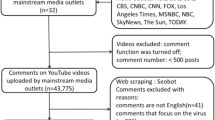Abstract
This chapter addresses the way scientific issues are discussed on social media, examining how individuals ground their knowledge claims on subjects they know little about and emphasising the role of group affiliations in such discussions. Using a large corpus of reader comments about articles in the Mail Online published during the early development phase of COVID-19 vaccines in 2020, the chapter maps trends in these forums, showing frequent rejection of mainstream science, boosted by high solidarity and strong group identity, among commenters critical of the proposed vaccine. Their stance can be related to current theories concerning distrust of expert systems and epistemological flattening in societies that are increasingly pervaded by social media. The pro-vaccine commenters, in contrast, tend to rely on rational arguments and although they emphasise social duty, their appeals are less emotional.
Access this chapter
Tax calculation will be finalised at checkout
Purchases are for personal use only
Similar content being viewed by others
References
Anesa, P., & Fage-Butler, A. (2015). Popularizing biomedical information on an online health forum. Revista Ibérica, 29, 105–128.
Breeze, R. (2021). Claiming credibility in online comments: Popular debate surrounding the COVID-19 vaccine. Publications, 9(3), 34. https://doi.org/10.3390/publications9030034
Breeze, R. (2022). Performing right-wing political identities on reader comments pages. Pragmatics & Society, 13(1), 85–106.
Bucholtz, M., & Hall, K. (2005). Identity and interaction: A sociocultural linguistic approach. Discourse Studies, 7(4-5), 585–614. https://doi.org/10.1177/1461445605054407
Cairney, P., & Wellstead, A. (2021). COVID-19: Effective policymaking depends on trust in experts, politicians, and the public. Policy Design and Practice, 4, 1–14. https://doi.org/10.1080/25741292.2020.1837466
Carvalho, A. (2007). Ideological cultures and media discourses on scientific knowledge: re-reading news on climate change. Public Understanding of Science, 16(2), 223–243.
Coen, S., Meredith, J., Woods, R., & Fernandez, A. (2020). Talk like an expert: The construction of expertise in news comments concerning climate change. Public Understanding of Science, 30(4), 400–416. https://journals.sagepub.com/doi/full/10.1177/0963662520981729
Corona, I. (2017). A life well lived of a lady well loved. In R. Breeze & I. Olza (Eds.), Evaluation in media discourse. European perspectives (pp. 179–202). Peter Lang. https://doi.org/10.3726/b10531
Fairclough, N. (1992). Linguistic and intertextual analysis within discourse analysis. Discourse & Society, 3(2), 193–217.
First Draft. (2021). Finding misinformation with “Rumour Cues”. 25 February. Retrieved June 22, 2022, from https://medium.com/1st-draft/
Giddens, A. (1994). Risk, trust, reflexivity. In U. Beck, A. Giddens, & S. Lash (Eds.), Reflexive modernization: Politics, tradition and aesthetics in the modern social order (pp. 194–197). Polity Press.
Gilbert, N., & Mulkay, M. (1984). Opening Pandora’s box: A sociological analysis of scientists’ discourse. Cambridge University Press.
Harsin, J. (2015). Regimes of posttruth, postpolitics, and attention economies. Communication, Culture and Critique, 8(2), 327–333.
Jaspal, R., & Yampolsky, M. (2011). Social representations of the Holocaust and Jewish Israeli identity construction: Insights from identity process theory. Social Identities, 17(2), 201–224.
Kienhues, D., Jucks, R., & Bromme, R. (2020). Sealing the gateways for post-truthism: Re-establishing the epistemic authority of science. Educational Psychology, 55, 144–154.
Kilgarriff, A., Baisa, V., Bušta, J., Jakubíček, M., Kovář, V., Michelfeit, J., Rychlý, P., & Suchomel, V. (2014). The Sketch Engine: Ten years on. Lexicography, 1, 7–36.
Milan, S. (2015). From social movements to cloud protesting: The evolution of collective identity. Information, Communication & Society, 18, 887–900. https://doi.org/10.1080/1369118X.2015.1043135
Milani, E., Weitkamp, E., & Webb, P. (2020). The visual vaccine debate on Twitter: A social network analysis. Media and Communication, 8(2), 364–375.
Nguyen, A., & Catalán-Matamoros, D. (2020). Digital mis/disinformation and public engagement with health and science controversies: Fresh perspectives from Covid-19. Media and Communication, 8(2), 323–328.
Nichols, T. (2017). The death of expertise: The campaign against established knowledge and why it matters. Oxford University Press.
Potter, J. (1996). Representing reality: Discourse, rhetoric and social construction. SAGE.
Salaverría, R., Buslón, N., López-Pan, F., León, B., López-Goñi, I., & Erviti, M. C. (2020). Desinformación en tiempos de pandemia: Tipología de los bulos sobre la COVID-19. Profesional de la Información, 29, e290315.
Scannell, D., Desens, L., Guadagno, M., Tra, Y., Acker, E., Sheridan, K., Rosner, M., Mathieu, J., & Fulk, M. (2021). COVID-19 vaccine discourse on Twitter. Journal of Health Communication, 26(7), 443–459.
Schmid-Petri, H. (2017). Politicization of science: How climate change skeptics use experts and scientific evidence in their online communication. Climatic Change, 145, 523–537.
Suler, J. (2004). The online disinhibition effect. Cyberpsychology & Behavior, 7(3), 321–326.
Terren, L., & Borge-Bravo, R. (2021). Echo chambers on social media. Review of Communication Research, 9, 99–118. Retrieved June 22, 2022, from https://rcommunicationr.org/index.php/rcr/article/view/94
Van Leeuwen, T. (1996). The representation of social actors. In C. R. Caldas-Coulthard & M. Coulthard (Eds.), Text and practices: Readings in critical discourse analysis (pp. 32–70). Routledge.
Van Leeuwen, T. (2007). Legitimation in discourse and communication. Discourse & Communication, 1(1), 91–112.
Vilar-Lluch, S. (2022). Social reaction to a new health threat: The perception of the Covid-19 health crisis by British and Spanish readerships. In A. Musolff, R. Breeze, K. Kondo, & S. Vilar-Lluch (Eds.), Pandemic and crisis discourse: Communicating Covid-19 and public health strategy (pp. 185–206). Bloomsbury.
Vraga, E. K., Tully, M., & Bode, L. (2020). Empowering users to respond to misinformation about Covid-19. Media and Communication, 8(2), 475–479.
Author information
Authors and Affiliations
Corresponding author
Editor information
Editors and Affiliations
Rights and permissions
Copyright information
© 2023 The Author(s), under exclusive license to Springer Nature Switzerland AG
About this chapter
Cite this chapter
Breeze, R. (2023). “Not One of Our Experts.” Knowledge Claims and Group Affiliations in Online Discussions of the COVID-19 Vaccine. In: Plo-Alastrué, R., Corona, I. (eds) Digital Scientific Communication. Palgrave Macmillan, Cham. https://doi.org/10.1007/978-3-031-38207-9_2
Download citation
DOI: https://doi.org/10.1007/978-3-031-38207-9_2
Published:
Publisher Name: Palgrave Macmillan, Cham
Print ISBN: 978-3-031-38206-2
Online ISBN: 978-3-031-38207-9
eBook Packages: Social SciencesSocial Sciences (R0)




